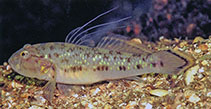| Family: |
Gobiidae (Gobies), subfamily: Gobiinae |
| Max. size: |
12.5 cm TL (male/unsexed) |
| Environment: |
reef-associated; freshwater; brackish; marine, amphidromous |
| Distribution: |
Indo-Pacific: from the Eastern Indian Ocean: Indonesia (Ref. 7050) and western Australia (Ref. 49596) to Western Pacific: Japan, Philippines and Indonesia. |
| Diagnosis: |
Dorsal spines (total): 6-7; Dorsal soft rays (total): 10-10; Anal spines: 1-1; Anal soft rays: 8-8. Characterized by pale greyish to light brown body color with brown mottling on back; midside with horizontal row of five brown blotches or clusters of smaller spots; caudal fin with scattered iridescent green flecks and submarginal dark band; first dorsal fin spines elongate and filamentous in male; rounded caudal fin, equal or slightly longer than head; longitudinal scale series 32; predorsal scales behind eyes; fully scaled opercle; upper half of cheek scaled; depth of body 3.5-3.8 in SL (Ref. 90102). |
| Biology: |
Inhabits mud bottoms of estuaries, marine lakes and occasionally in the vicinity of reefs (Ref. 90102). Common in marine lakes (Ref. 37816). |
| IUCN Red List Status: |
Least Concern (LC); Date assessed: 02 March 2020 Ref. (130435)
|
| Threat to humans: |
harmless |
Source and more info: www.fishbase.org. For personal, classroom, and other internal use only. Not for publication.
